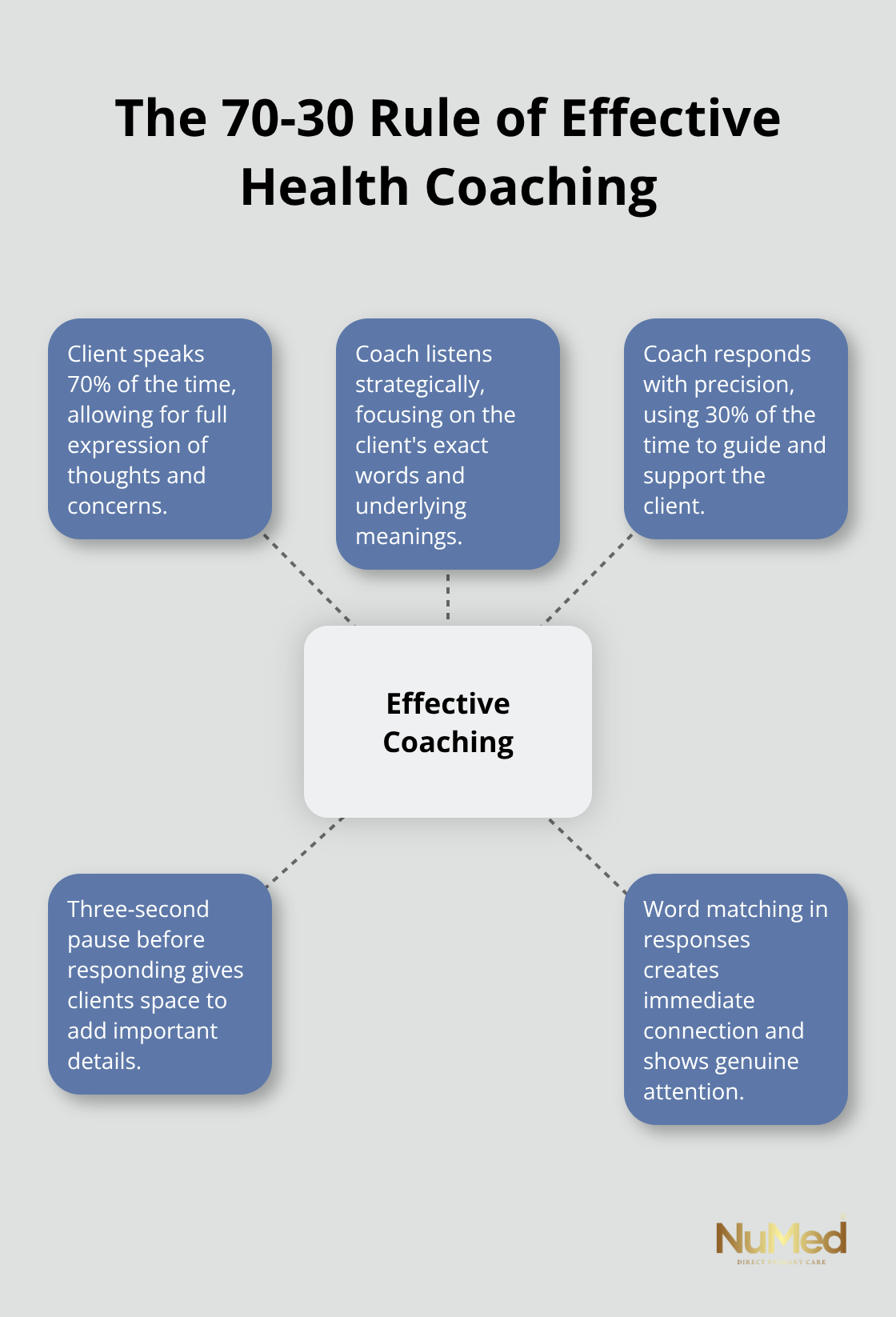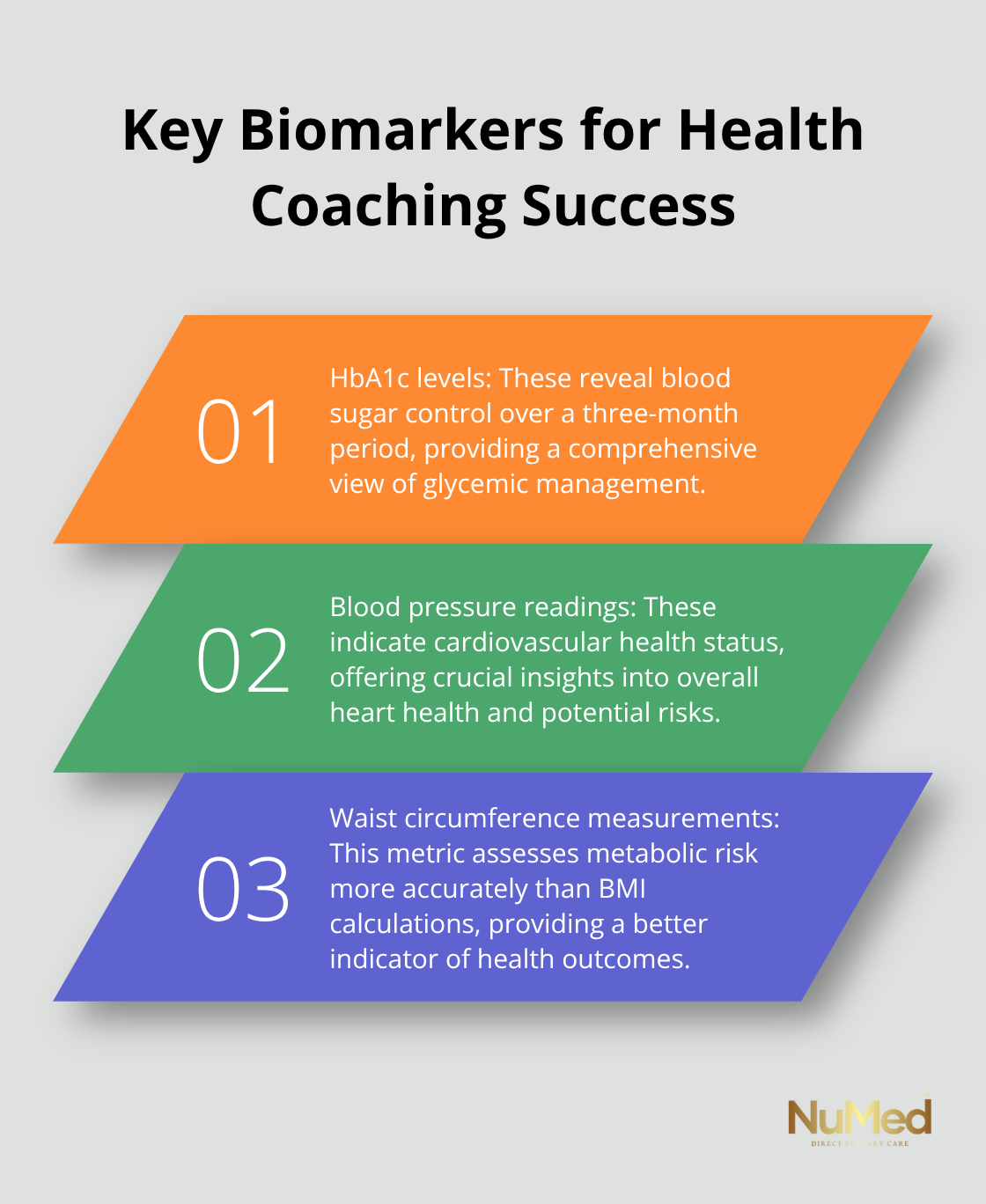Health coaching has transformed how people approach wellness, with proven techniques showing remarkable success rates. Studies indicate that structured coaching programs can improve health outcomes by up to 70% compared to traditional approaches.
At NuMed DPC, we’ve seen firsthand how the right health coaching techniques create lasting change. The methods we’ll explore combine scientific evidence with practical application to help you achieve better results.
Evidence-Based Health Coaching Techniques
Motivational Interviewing Changes Everything
Motivational interviewing stands as the most powerful technique for health behavior change, enhancing readiness for change by helping clients explore and resolve ambivalence rather than push solutions. This method works when coaches explore client ambivalence rather than push solutions. The technique involves open-ended questions like “What concerns you most about your current eating patterns?” instead of direct instructions. Miller and Rollnick’s research demonstrates that people change when they hear themselves argue for change, not when others lecture them.
SMART Goals Drive Measurable Results
Generic goals fail 92% of the time, but SMART criteria transform vague intentions into achievable outcomes. People who write them down and share them are 76% more likely to succeed, while those who set goals are 43% more likely to achieve success overall. Specific goals like “walk 8,000 steps daily for 30 days” outperform broad statements like “exercise more.” Measurable components allow progress tracking through apps like MyFitnessPal or simple step counters. Achievable targets prevent the all-or-nothing mentality that derails progress. Relevant goals connect to personal values rather than external pressure. Time-bound deadlines create urgency and accountability that drive consistent action.

Cognitive Restructuring Breaks Mental Barriers
Cognitive behavioral techniques address the thought patterns that sabotage health efforts. The American Journal of Lifestyle Medicine reports that clients who identify and challenge limiting beliefs achieve 65% better long-term adherence to health plans. Common destructive thoughts include “I’ve failed before, so I’ll fail again” or “I don’t have time for healthy habits.” Coaches guide clients through thought records that examine evidence for and against these beliefs. Replacement thoughts like “Past attempts taught me valuable lessons” create mental frameworks that support sustainable change.
These evidence-based techniques form the foundation of effective health coaching, but their success depends entirely on the quality of the relationship between coach and client.
How Do You Build Client Relationships That Actually Work
Successful health coaching depends on relationship quality more than technique mastery. The difference lies in three specific relationship practices that transform ordinary interactions into powerful change catalysts.
Master the Art of Strategic Listening
Active listening goes far beyond nodding and saying yes. Effective coaches use the 70-30 rule, where clients talk 70% of the time while coaches listen strategically and respond with precision. The technique involves reflecting back what clients say with their exact words, not paraphrased versions. When a client says they feel overwhelmed by meal planning, respond with “overwhelmed” rather than “stressed” or “busy.” This word matching creates an immediate connection and shows genuine attention.
Pause for three full seconds before you respond to any client statement. This silence feels uncomfortable, but it gives clients space to add details they initially held back. Strategic pauses help coaches gather more comprehensive information about client challenges and motivations.

Create Psychological Safety Through Consistency
Trust builds through predictable actions, not grand gestures. Show up exactly when scheduled, respond to messages within 24 hours, and maintain the same supportive tone regardless of client setbacks. Research from Harvard Business School demonstrates that consistency in small actions creates stronger trust than occasional impressive interventions.
Never express shock or disappointment when clients report failures or poor choices. Instead, respond with curiosity about what happened and what they learned. This approach reduces client defensiveness and makes clients more open to change.
Establish Clear Communication Boundaries
Set specific boundaries about communication methods and stick to them religiously. Clients need to know exactly how and when they can reach you, which creates a safe container for their health transformation journey. This predictability reduces anxiety and builds confidence in the coaching relationship.
These relationship foundations create the trust necessary for meaningful change, but their impact becomes visible only when you track progress through concrete measurements and data.
How Do You Track What Actually Matters
Successful health coaching depends on the measurement of the right metrics at the right intervals. The Veterans Affairs study found that clients who tracked three specific biomarkers showed 40% better outcomes than those who monitored weight alone.
Focus on Biomarkers That Predict Success
HbA1c levels reveal blood sugar control over three months, while blood pressure readings indicate cardiovascular health status. Waist circumference measurements assess metabolic risk more accurately than BMI calculations. These three measurements predict long-term health outcomes better than scale weight alone.
Take baseline measurements within the first session, then reassess every 30 days for acute conditions and every 90 days for preventive care. This schedule catches problems early while clients still have time to adjust their approach.

Technology That Changes Behavior
Continuous glucose monitors provide a more granular view of glycaemic management compared to traditional blood glucose measurements. The American Journal of Lifestyle Medicine reports that clients who use CGMs reduce their average blood glucose 23% faster than those who rely on finger stick tests.
Wearable devices like Fitbit or Apple Watch track sleep quality, heart rate variability, and daily activity patterns. These devices reveal hidden health patterns that explain energy crashes or mood changes. Apps like MyFitnessPal show nutrient deficiencies that traditional food logs miss.
Food photo journals capture behavior more accurately than written logs because they eliminate the 40% underreporting rate found in traditional food diaries (clients forget to write down snacks but rarely forget to photograph meals).
Adjustment Strategies That Work
Review progress data every two weeks, not monthly, because behavioral momentum dies after 14 days without feedback. When metrics plateau, change one variable only. If weight loss stalls after six weeks, adjust meal timing rather than calories and exercise simultaneously.
This isolated approach identifies what actually drives results. Failed goals need immediate restructuring rather than motivational speeches. Replace unachievable targets with micro-goals that build confidence through consistent wins. Data without action plans creates frustrated clients who abandon their health goals entirely.
Final Thoughts
These health coaching techniques create measurable change when you apply them consistently. Motivational interviewing, SMART goal setting, and cognitive restructuring form the foundation, while strategic listening and trust-building amplify their effectiveness. The Veterans Affairs data proves that clients who combine these methods with systematic tracking achieve 40% better outcomes than those who use traditional approaches.
Professional health coaching delivers benefits that extend far beyond initial goals. Clients develop self-awareness skills that prevent future health crises, build confidence through consistent wins, and create sustainable habits that last decades. The 70% improvement rate we see with structured programs reflects this comprehensive approach to behavior change (which addresses both mindset and action).
Your health transformation starts with the right support system. We at NuMed DPC combine these proven health coaching techniques with personalized care that addresses root causes rather than symptoms. Our direct primary care model integrates health coaching with functional medicine and extensive lab services, creating a comprehensive approach to optimal health outcomes.
















